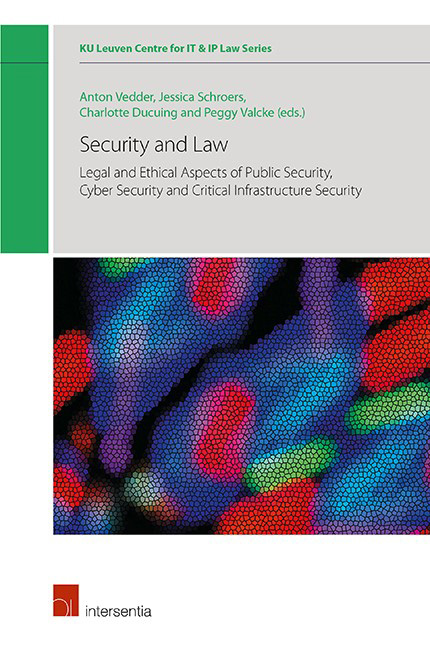 Security and Law
Security and Law Book contents
- Frontmatter
- Contents
- List of Contributors
- Chapter 1 Introduction: Security and Law in a Digitizing World
- Chapter 2 Safety, Security and Ethics
- Chapter 3 National and Public Security within and beyond the Police Directive
- Chapter 4 Criminal Profiling and Non-Discrimination: On Firm Grounds for the Digital Era?
- Chapter 5 Operationalization of Information Security through Compliance with Directive 2016/680 in Law Enforcement Technology and Practice
- Chapter 6 Protecting Human Rights through a Global Encryption Provision
- Chapter 7 Identity Management and Security
- Chapter 8 Towards an Obligation to Secure Connected and Automated Vehicles “by Design”?
- Chapter 9 The Cybersecurity Requirements for Operators of Essential Services under the NIS Directive – An Analysis of Potential Liability Issues from an EU, German and UK Perspective
- Chapter 10 The ‘by Design’ Turn in EU Cybersecurity Law: Emergence, Challenges and Ways Forward
- Chapter 11 Promoting Coherence in the EU Cybersecurity Strategy
- Chapter 12 Challenges of the Cyber Sanctions Regime under the Common Foreign and Security Policy (CFSP)
- Chapter 13 International (Cyber)security of the Global Aviation Critical Infrastructure as a Community Interest
- Cumulative Bibliography
- Miscellaneous Endmatter
Chapter 4 - Criminal Profiling and Non-Discrimination: On Firm Grounds for the Digital Era?
Published online by Cambridge University Press: 23 January 2020
- Frontmatter
- Contents
- List of Contributors
- Chapter 1 Introduction: Security and Law in a Digitizing World
- Chapter 2 Safety, Security and Ethics
- Chapter 3 National and Public Security within and beyond the Police Directive
- Chapter 4 Criminal Profiling and Non-Discrimination: On Firm Grounds for the Digital Era?
- Chapter 5 Operationalization of Information Security through Compliance with Directive 2016/680 in Law Enforcement Technology and Practice
- Chapter 6 Protecting Human Rights through a Global Encryption Provision
- Chapter 7 Identity Management and Security
- Chapter 8 Towards an Obligation to Secure Connected and Automated Vehicles “by Design”?
- Chapter 9 The Cybersecurity Requirements for Operators of Essential Services under the NIS Directive – An Analysis of Potential Liability Issues from an EU, German and UK Perspective
- Chapter 10 The ‘by Design’ Turn in EU Cybersecurity Law: Emergence, Challenges and Ways Forward
- Chapter 11 Promoting Coherence in the EU Cybersecurity Strategy
- Chapter 12 Challenges of the Cyber Sanctions Regime under the Common Foreign and Security Policy (CFSP)
- Chapter 13 International (Cyber)security of the Global Aviation Critical Infrastructure as a Community Interest
- Cumulative Bibliography
- Miscellaneous Endmatter
Summary
INTRODUCTION
Within a democratic society, and governed by the rule of law, law enforcement and intelligence agencies serve the maintenance of public tranquillity, law and order. They seek to prevent, detect and combat crime, and provide assistance and service functions to the public. Tasked with the protection against and prevention of threats to public and national security and to the fundamental interests of society, they are bound to protect and respect fundamental rights, and in particular those enshrined within the European Convention on Human Rights (hereinafter ECHR). Nevertheless, for the performance of their functions, and in order to safeguard their independence, effectiveness and impartiality, they have been granted a wide degree of discretion.
As guardians of public and national security, public authorities have found in big data analytics a new instrument to facilitate the performance of their core activities, i.e. the prevention, investigation, detection or prosecution of criminal offences or the execution of criminal penalties. Data-driven technologies in particular help public authorities in their battle against different forms of criminality. One such application, is the collection, and subsequent analysis, of data for the purposes of building criminal profiles which can be deployed either in a predictive, real-time or post-fact manner. Criminal profiling has been described as the process whereby ‘exhibited criminal behaviours are evaluated for the purpose of making some prediction concerning the characteristics of the probable off ender, in order to provide information that can assist in criminal investigations’. The increase in the availability of data, in combination with rapid technological developments in the fields of data analysis, have increased the potential for, and the scope at which, profiling strategies can be developed and deployed. Due to these advancements however, the associated risks criminal profiles may pose have increased as well. Whether they are scientifically sound or not, profiling tactics, or a variation thereof, are generally perceived as promising and beneficial for law enforcement endeavours, and there for relied, and invested, upon.
The validity and evaluation of profiling can be approached through many different angles, this paper aims to contribute to the current discourse by evaluating one specific risk of profiling: the potential discriminatory nature of profiling practices.
- Type
- Chapter
- Information
- Security and LawLegal and Ethical Aspects of Public Security, Cyber Security and Critical Infrastructure Security, pp. 63 - 96Publisher: IntersentiaPrint publication year: 2019


